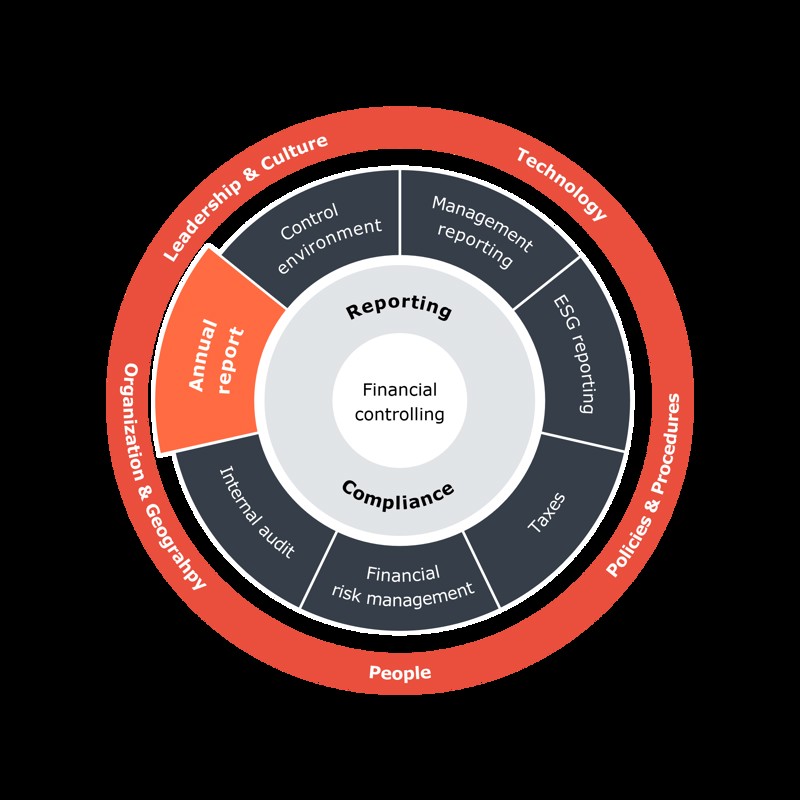We meet Lykke Rømer at Zealand Pharma's headquarters in Søborg, where biotech companies are lined up like pearls on a string. She leads us into a meeting room furnished with an enormous long table – a place for big discussions and decisions.
We are here to learn about the growth and development that Zealand Pharma has experienced in recent years – where major discussions and decisions are part of everyday life. Additionally, we are curious to hear Lykke's reflections on how Zealand Pharma, with its limited size, has organised its finance function while being subject to high and changing compliance requirements.
The conversation begins with a backward look at Zealand Pharma's journey since the company was founded.
Unfortunately, we cannot predict the future ...
Therefore, some things may have changed since our articles were published – the people involved may have changed jobs, and the world may have been turned upside down by American presidents or other catalysts for unexpected events – you get the point. Since we visited Lykke Rømer, she has changed jobs and is now Head of Finance at MedTrace Pharma.
An account that has steadily grown in complexity
Zealand Pharma has been on a rapid journey of growth and development since the company was founded in 1998. At that time, its activities were focused on developing the active ingredients for peptide-based medicines, and over the following decade, the company built a comprehensive development pipeline. In 2010, Zealand Pharma was listed on Nasdaq OMX in Copenhagen. The development continued, and in 2017 – as part of strengthening the company’s position to raise additional capital from American investors – it was also listed with American Depositary Shares on Nasdaq in the US.
Since 1998, the company has transitioned from preparing an annual financial report in accordance with the Danish Financial Statements Act to quarterly interim reports under IFRS – and with the listings in both Denmark and the US, it has also adapted to additional disclosure requirements under local accounting regulations. As a side note, the company was, until its delisting in the US in 2022, also subject to control environment requirements under the Sarbanes-Oxley Act.
Lykke explains: 'Zealand does not seem that complex when viewed from the outside. But the reality is quite different if you look at the financial reporting, which has steadily grown in complexity since the company’s founding. This is partly due to the formal requirements imposed on a listed company, and partly due to Zealand’s strategic acquisitions and divestments of activities, which have, as a consequence, also resulted in us entering into complex financing agreements. In addition, we have introduced share-based remuneration for the management team, on top of the more standard activities that are themselves complex from an accounting perspective – and let us not forget the discontinued operations in the US, which also added to the complexity.'
Many of the accounting matters are entirely standard for a listed biotech company, whereas others are, in fact, very rare. This means that Zealand Pharma often works very closely with its advisers to clarify and meet compliance requirements.

Lykke Rømer, VP, Head of Finance, in Zealand Pharma
From biotech to pharmaceutical company – and back to biotech again
Zealand Pharma was originally a classic biotech company focused on developing pharmaceutical products that were commercialised through strategic partnerships with pharmaceutical companies, for example via a royalty model.
However, the company had the ambition to become a fully integrated biotech company with its own sales and production. To achieve this, Zealand Pharma acquired Valeritas in April 2020, an American pharmaceutical company facing financial difficulties. Through this acquisition, Zealand Pharma gained a platform with both commercial and compliance-related capabilities, enabling them to market their own products in the US market as an alternative to building these capabilities from scratch.
'The idea behind the acquisition was that Valeritas would serve as a sales platform for Dasiglucagon-based products, which had just been approved by the US Food and Drug Administration (FDA). In other words, we wanted to manage the entire value chain – from development and production to the sale of the product. But we knew we could not enter the US market with a snap of our fingers,' says Lykke, elaborating further.
'The FDA approval was a milestone for us, as it meant we could now become a pharmaceutical company with our own products on the shelves.'
A strategic change in direction
But already in 2022, Zealand Pharma experienced a strategic shift as sales in the US did not go as expected. This resulted in a decision to make a strategic U-turn.
'We went from having built a fully commercial structure with 200+ employees, sales representatives in every state and a large compliance team, to once again selling our products exclusively through partnership agreements with companies like Novo Nordisk. We simply removed the entire commercial division, and the products Zealand had on the market, from development to sales, were sold off,' Lykke explains.
She adds enthusiastically: 'But where we are today is more exciting than it has ever been. Because we have taken the bull by the horns. So here in 2023, we are looking at a partnership strategy that gives us a stronger position for the future, allowing us to focus on what we do best – developing our products.'

Financial Controlling & Compliance framework
The figure illustrates that Financial Controlling forms the foundation for the finance function's responsibilities in Reporting and Compliance, which consist of a range of core tasks. To achieve a high level of quality and efficiency, these must be adapted to the company's specific circumstances as well as the framework conditions shown in the outer ring of the circle.
We have highlighted the area 'Annual Report' in the figure. This is because these are precisely the tasks you can learn more about in this article.
Basico can provide advice and assistance across all areas in the model.
Thoughts on the optimal finance team
"I had just taken over the finance team in September 2021 when we faced the strategic shift. So, I revisited the team in terms of the competencies now required, which meant assembling a new team again in 2021 and continuing through to December 2022," Lykke smiles and adds: "So it has not been a quiet process, and the journey we have been on, I would call intense."
But what thoughts did Lykke have when she was putting together the new team of finance professionals?
When we ask about the finance team, Lykke smiles. Her reflections strongly underscore the complexity of the finance-related compliance rules that Zealand must comply with and meet.
"We essentially have to comply with many of the same rules as, for example, Novo Nordisk. And when you compare that organisation to ours, it is obvious that the workload relative to the number of hands in Finance can be heavy. That said, the rapid growth we are still undergoing has led to an increasing need for recruitment. And it is a challenge to assemble a team that can cover everything,' she emphasises.
"The team of finance professionals that fits both Zealand’s size and the high compliance requirements is characterised by being highly skilled. And they also have a mindset where 'business as usual' does not exist. They are eager and motivated by the fact that the machinery often and unexpectedly accelerates to sixth gear – very quickly,' Lykke elaborates.
It is therefore a deliberate choice on Lykke’s part that the finance profiles in her team elevate deliverables and develop the level of what the finance organisation provides. She describes it as a small but professionally mature finance organisation.
"Some of the people on my team have seen and experienced Finance challenges over the past four years that many do not encounter in an entire career. And when the experts say, ‘I will need to look into that,’ well, then you know it is complex,' Lykke concludes her point.
"Use experts instead of hiring in-house. It is so difficult to predict what changes might occur. But you can maintain a sharp finance team by using experts as an extension of your team.”
The advantage of a network of trusted advisors
And experts – that is exactly what Lykke has chosen to use strategically as an extension of her team. As she explains, 'I am not an IFRS specialist, and when things get critical, a basic understanding just is not enough. That is when you need highly specialised experts to step in.'
The conversation then turns to what, for Lykke, characterises a good advisor. Here, trust and confidentiality particularly stand out as key elements. She explains:
'I need to trust the quality, and there should not be tiresome back-and-forth. Because then the auditors can trust the numbers and the financial statements. Which creates peace of mind. And it is also important that I can rely on them during peak periods when sudden needs arise. That way, I can give my internal finance team the breathing space they need.'
As a concrete example, Lykke mentions that in 2022, Zealand Pharma’s auditors were selected for a quality review by the PCAOB – the US Public Company Accounting Oversight Board – which is said to be the most demanding review an auditor can face.
'In that situation, the auditors are subjected to an assessment of whether the company’s documentation quality is sufficient according to accounting regulations, and whether the auditors’ work meets auditing standards – meaning the entire chain must be robust and of very high quality, as dictated by the rules. The auditors are held accountable for this. It is an extremely serious situation, as it could mean the end of their careers if the work is deemed insufficient. So it is absolutely crucial that not only I, but also our auditors, feel confident in the external expertise we rely on to assist us. Because that is what they are held accountable for.'
Lykke wraps up the point and adds: 'We passed without any remarks. Even in the worst year imaginable.'
This leads to Lykke’s advice for others navigating a complex compliance landscape:
'Use experts instead of hiring in-house. It is so difficult to predict what changes might occur. But you can maintain a sharp finance team by using experts as an extension of your team.'

Do you need help implementing IFRS standards in practice?
We can assist you with most areas within financial compliance – from quality assurance of bookkeeping to accounting treatment of complex agreements and fulfillment of reporting requirements applicable to publicly listed companies, from risk assessment to design and implementation of internal controls and much more. Regardless of your company's needs, our consultants can contribute with an efficient and pragmatic solution based on solid experience gained in the financial engine room.

 en
en
 da
da



